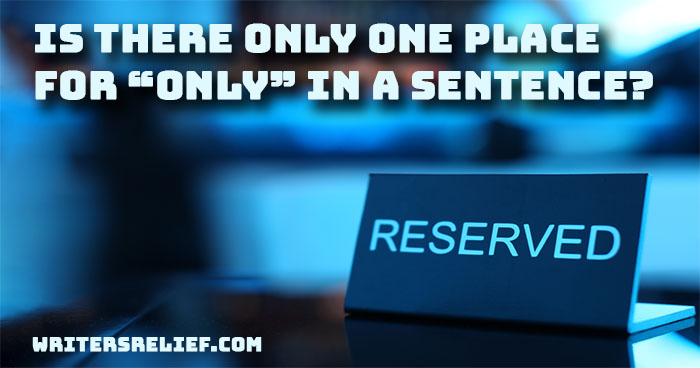
Some writers agonize over the proper way to use the word “only” in a sentence. Others don’t agonize at all (because they’re fine with colloquial usage).
As you know, we at Writer’s Relief work with creative writers. If you were a fly on the wall in our office, you would hear many conversations and debates about the smallest of details. (Once, two staffers spent a full half hour debating the placement of a single comma—we kid thee not!)
But when it comes to creative writing, we feel it’s important to recognize that adhering too strictly to the rules of grammar and usage can sometimes make for writing that has an overly formal, grammar-school sound.
The formal rules about how to use “only” are quite strict. But are they always important?
Here’s an excerpt from the grammar blog You Don’t Say.
Jan Freeman of The Boston Globe has addressed this issue repeatedly. Here’s what she had to say in Ambrose Bierce’s Write It Right:
“Usage writers love to ring the changes on only, comparing ‘Only I want a cup of tea,’ ‘I only want a cup of tea,’ ‘I want only a cup of tea,’ and so on. In the wild, however, only is almost never truly ambiguous. And too-strict observance of the rule creates an unnatural, overemphatic construction: ‘I want only a drink of water.’ In some cases, too, only modifies a phrase or an entire sentence, and shouldn’t be moved: ‘We were only trying to help.’
“Fowler 1926 blamed the only fetish on pedants who wanted to make English ‘an exact science or an automatic machine.’ Yet in 2009, syndicated columnist James J. Kilpatrick was still writing an annual column on the importance of only. All this is a waste of time, as Fowler said it would be.”
We’re not sure we would go so far as to call discussion about “only” a waste. In fact, we think it’s kinda fun to poke around in the gap between diction and syntax.
Sometimes we adhere very strictly to the rules of grammar when the situation calls for buttoned-up formality. But other situations demand that we kick back and “chillax” (who wants to be the only person at the barbeque in a suit and tie?).
On a friendly neighborhood writing blog like this one, we like to take a more casual tone. Read more: The Purist Debate and The English Language. And sometimes, especially when we’re proofreading creative writing, we must be careful not to damage a writer’s style with overly heavy-handed editing.
And now, if you’ll excuse us, we’re about to have an office-wide meeting to talk about sentence fragments. Because that’s how we roll.
Happy writing!
















I would review placement of only in song titles for a real mix of position. Only you. Only the lonely. My one and only you. Etc let’s not forget the music And I dare say poetic license applied to this word.
Robert, Thank you for your comment. You’re right, the list goes on and on!
I get a kick out of the misplaced ‘only’. The above examples all mean different things. Placement is paramount!
Language is fluid. Prose that sticks too closely to the rules sounds lifeless, as if you’re afraid to move. In the end, it’s the effect on the reader that matters, not how many red or blue marks a professional grammarian would give you.
I often see such “rules” and have gotten tired of reading them. When I wrote radio commercials, I made them easy to understand by the masses and I don’t care what the rulemakers make, however I do replace “only” with “just” from time to time in my fiction. Real people and editors never once mentioned a problem with “only.”